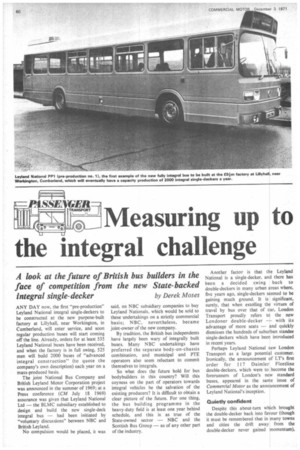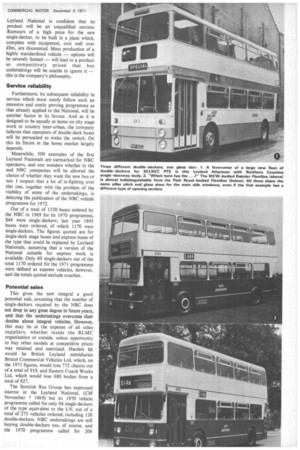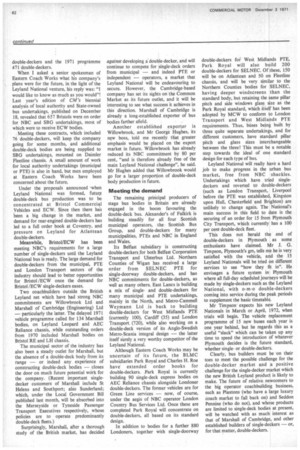Measuring up to the integral challenge
Page 62

Page 63

Page 64

If you've noticed an error in this article please click here to report it so we can fix it.
A look at the future of British bus builders in the face of competition from the new State-backed
Integral single-decker by Derek Moses
ANY DAY now, the first "pre-production" Leyland National integral single-deckers to be constructed at the new purpose-built factory at Lillyhall, near Workington, in Cumberland, will enter service, and soon regular production buses will start coming off the line. Already, orders for at least 535 Leyland National buses have been received, and when the factory is in full swing, 525 men will build 2000 buses of "advanced integral construction" (to quote the company's own description) each year on a mass-produced basis.
The joint National Bus Company and British Leyland Motor Corporation project was announced in the summer of 1969; at a Press conference (CM July 18 1969) assurance was given that Leyland National Ltd — the BLMC subsidiary established to design and build the new single-deck integral bus — had been initiated by "voluntary discussions" between NBC and British Leyland.
No compulsion would be placed, it was said. on NBC subsidiary companies to buy Leyland Nationals, which would be sold to these undertakings on a strictly commercial basis; NBC. nevertheless, became joint-owner of the new company.
By tradition. the British bus independents have largely been wary of integrally built buses. Many NBC undertakings have preferred the separate body-on-chassis combination, and municipal and PTE operators also seem reluctant to commit themselves to integrals.
So what does the future hold for bus bodybuilders in this country? Will this coyness on the part of operators towards integral vehicles be the salvation of the existing producers? It is difficult to obtain a clear picture of the future. For one thing, the bus building programme in the heavy-duty field is at least one year behind schedule, and this is as true of the State-owned sector — NBC and the Scottish Bus Group — as of any other part of the industry. Another factor is that the Leyland National is a single-decker, and there has been a decided swing back to double-deckers in many urban areas where, five years ago, single-deckers seemed to be gaining much ground. It is significant, surely, that when extolling the virtues of travel by bus over that of car, London Transport proudly refers to the new Londoner double-decker -with its advantage of more seats — and quickly dismisses the hundreds of suburban standee single-deckers which have been introduced in recent years.
Perhaps Leyland National saw London Transport as a large potential customer. Ironically, the announcement of LT's first order for 117 Daimler Fleetline double-deckers, which were to become the forerunners of London's new standard buses, appeared in the same issue of Commercial Motor as the announcement of Leyland National's inception,
Quietly confident
Despite this about-turn which brought the double-decker back into favour (though it must be remembered that in many towns and cities the drift away from the double-decker never gained momentum),
Leyland National is confident that its product will be an unqualified success. Rumours of a high price for the new single-decker, to be built in a plant which, complete with equipment, cost well over am, are discounted. Mass production of a highly standardized vehicle — options will be severely limited — will lead to a product so competitively priced that bus undertakings will be unable to ignore it — this is the company's philosophy.
Service reliability Furthermore, its subsequent reliability in service which must surely follow such an intensive and costly proving programme as that already applied to the National, will be another factor in its favour. And as it is designed to be equally at home on city stage work or country inter-urban, the company believes that operators of double-deck buses will be persuaded to make the switch. On this its future in the home market largely depends.
Meanwhile, 500 examples of the first Leyland Nationals are earmarked for NBC operators, and one wonders whether in the end NBC companies will be allowed the choice of whether they want the new bus or not. I suspect that a lot of in-fighting over this one, together with the problem of the viability of some of the undertakings, is delaying the publication of the NBC vehicle programme for 1972.
Out of a total of 1320 buses ordered by the NBC in 1969 for its 1970 programme, 844 were single-deckers; last year 1895 buses were ordered, of which 1170 were single-deckers. The figures quoted are for single-deck stage buses and express buses of the type that could be replaced by Leyland Nationals, assuming that a version of the National suitable for express work is available. Only 60 single-deckers out of the total 1170 ordered for the 1971 programme were defined as express vehicles, however, and the totals quoted exclude coaches.
Potential sales This gives the new integral a good potential sale, assuming that the number of single-deckers required by the NBC does not drop to any great degree in future years, and that the undertakings overcome their doubts about integral vehicles. However, this may be at the expense of all other suppliers, whether inside the BLMC organization or outside, unless opportunity to buy other models at competitive prices was retained and exercised. Hardest hit would be British Leyland subsidiaries Bristol Commercial Vehicles Ltd, which, on the 1971 figures, would lose 772 chassis out of a total of 919, and Eastern Coach Works Ltd, which would lose 680 bodies from a total of 827.
The Scottish Bus Group has expressed interest in the Leyland National, (CM November 7 1969) but its 1970 vehicle programme called for only 94 single-deckers of the type equivalent to the LN, out of a total of 275 vehicles ordered, including 120 double-deckers. NBC undertakings are still buying double-deckers too, of course, and the 1970 programme called for 206
double-deckers and the 1971 programme 471 double-deckers.
When I asked a senior spokesman of Eastern Coach Works what his company's plans were for the future, in the light of the Leyland National venture, his reply was: "I would like to know as much as you would"! Last year's edition of CM'S biennial analysis of local authority and State-owned bus undertakings, published on December 18, revealed that 657 Bristols were on order for NBC and SBG undertakings, most of which were to receive ECW bodies.
Meeting these contracts, which included 76 double-deckers, will keep the company going for some months, and additional double-deck bodies are being supplied to SBG undertakings, mounted on Daimler Fleetline chassis. A small amount of work for local authority undertakings (municipal or PTE) is also in hand, but men employed at Eastern Coach Works have been concerned about the future.
Under the proposals announced 'when Leyland National wag formed, future double-deck bus production was to be concentrated at Bristol Commercial Vehicles and ECW. Since then there his been a big change in the market, and demand for rear-engined double-deckers has led to a full order book at Coventry, and pressure on Leyland for Atlantean double-deckers.
Meanwhile, Bristol/ECW has been meeting NBC's requirements for a large number of single-deckers until the Leyland National bus is ready. The large demand for double-deckers from the municipal, PTE and London Transport sectors of the industry should lead to better opportunities for Bristol /ECW once the demand for Bristol /EC W single-deckers eases.
Two coachbuilders outside the British Leyland net which have had strong NBC commitments are Willowbrook Ltd and Marshall of Cambridge (Engineering) Ltd — particularly the latter. The delayed 1971 vehicle programme called for 134 Marshall bodies, on Leyland Leopard and AEC Reliance chassis, while outstanding orders from 1970 included Marshall bodies on Bristol RE and LH chassis.
The municipal sector of the industry has also been a steady outlet for Marshall, but the absence of a double-deck body from its range — or indeed any experience of constructing double-deck bodies — closes the door on much future potential wcirk for the company. (Recent important singledecker customers of Marshall include St Helens and Southport; also Sunderland; which, under the Local Government Bill published last month, will be absorbed into the Merseyside or Tyneside Passenger Transport Executives respectively, whose policies are to operate predominantly double-deck fleets.) Surprisingly, Marshall, after a thorough study of the British market, has decided against developing i double-decker, and will continue to compete for single-deck orders from municipal — and indeed PTE or independent — operators, a market that Leyland National will be endeavouring to secure. However, the Cambridge-based company has set its sights on the Common Market as its future outlet, and it will be interesting to see what success it achieves in this direction. Marshall of Cambridge is already a long-established exporter of bus bodies farther afield.
Another established exporter is Willowbrook, and Mr George Hughes, its new boss, told me recently that greater emphasis would be placed on the export market in future. Willowbrook has already reduced its NBC commitment by 80 per cent, "and is therefore already free of the main Leyland National challenge", he said. Mr Hughes added that Willowbrook would go for a larger proportion of double-deck body production in future.
Meeting the demand
The remaining principal producers of stage bus bodies in Britain are already engaged in the boom favouring the double-deck bus. Alexander's of Falkirk is building steadily for all four Scottish municipal operators, the Scottish Bus Group, and double-deckers for many municipalities, PTEs and NBC in England and Wales.
Its Belfast subsidiary is constructing double-deckers for both Belfast Corporation Transport and Ulsterbus Ltd. Northern Counties of Wigan has received a large order from SELNEC PTE for single-doorway double-deckers, and has NBC commitments for double-deckers, as well as many others. East Lancs is building a mix of singleand double-deckers for many municipal and PTE undertakings, mainly in the North, and Metro-Cammell Weymann Ltd is back to building double-deckers for West Midlands PTE (currently 100), Cardiff (35) and London Transport (720), while also working on a double-deck version of its Anglo-Swedish Metro-Scania integral design — the latter itself sUrely a very worthy competitor of the Leyland National.
Although Eastern Coach Works may be uncertain of its future, the BLMC subsidiaries Park Royal and Charles H. Roe have extended order books for double-deckers. .Park Royal is currently building 90 single-deck express bodies on AEC Reliance chassis alongside Londoner double-deckers. The former vehicles are for Green Line services — now, of course, under the aegis of NBC operator London Country Bus Services Ltd. Once these are completed Park Royal will concentrate on double-deckers, all based on its standard design.
In addition to bodies for a further 880 Londoners, together with single-doorway
double-deckers for: West Midlainds PTE, Park Royal will also ttild 200 double-deckers for SELNEC. Of these, 150 will be on Atlantean and 50 on Fleetline chassis, and will be very similar to the Northern Counties bodies for SELNEC, having deeper windscreens than the standard body, but retaining the same pillar pitch and side windows glass size as the Park Royal standard, which itself has been adopted by MCW to conform to London Transport and West Midlands PTE requirements. Thus, buses being built by three quite separate undertakings, and for different customers, have standard pillar pitch and glass sizes interchangeable between the three! This must be a notable step towards the ideal of one standard design for each type of bus.
Leyland National will really have a hard job to make progress in the urban bus market, free from NBC shackles. Undertakings which have tried singledeckers and reverted to douole-deckers (such as London Transport, Liverpool before the PTE was established, Kingston upon Hull, Chesterfield and Brighton) are unlikely to change again. The National's main success in this field to date is the securing of an order for 15 from Plymouth City Transport, which currently has a 100 per cent double-deck fleet.
This does not herald the end of double-deckers in Plymouth as some enthusiasts have claimed. Mr J. G. Timpson, Plymouth's gm, tells me he is very satisfied with the vehicle, and the 15 Leyland Nationals will be tried on different services to see "how they fit in". He envisages a future system in Plymouth where all full-day scheduled journeys will be made by single-deckers such as the Leyland National, with o-m-o double-deckers coming into service during the peak periods to supplement the basic timetable.
Mr Timpson expects his new Leyland Nationals in March or• April, 1972, when trials will begin. The vehicle replacement programme of 15 new buses each year is one year behind, but he regards this as a useful "slack" which can be taken up any time to speed the introduction of whatever Plymouth decides is the future standard, whether singleor double-deckers.
Clearly, bus builders must be •on their toes to meet the possible challenge for the double-decker market and a positive challenge for the single-decker market which the new British Leyland product is likely to make. The future of relative newcomers to the big operator coachbuilding business, such as Plaxtons (who have a large luxury coach market to fall back on) and Seddon Pennine (who do not), and whose products are limited to single-deck bodies at present, will be watched with as much interest as that of Marshall of Cambridge, and other established builders of single-deckers — or, for that matter, double-deckers.


































































































































